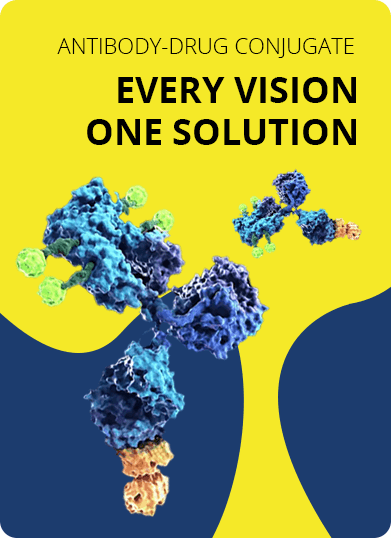- Home
- UTC Development
- Antibody-based Probe Development
- Antibody-Biomolecule Probe Development
Antibody-Biomolecule Probe Development Service
Biomolecules (biological molecules) are a big family of bio-organic entities that play important roles (regulatory, catalyzing…) in living organisms. They present a variety of molecules with a wide range of molecular weight (MW) distribution. Small biomolecules, such as vitamins, hormones and metabolites, usually fall in the range of MW<5 kDa while large biomolecules (macromolecules), including proteins, nucleic acids and carbohydrates, usually have much larger MWs.
Biomolecules have been widely studied and exploited as bio-probes for the diagnosis and treatment of various diseases including cancer. For instance, biotin (also known as vitamin B7, vitamin H or coenzyme R) is widely used to conjugate proteins via a process termed biotinylation in various biochemical assays. The biotinylated proteins are commonly used for protein, lipid and DNA purification, RNA fishing, biosensors, as well as cell sorting. Moreover, photobiotin, a biotin derivative, provides photoactivable labels for the preparation of protein, DNA, or RNA probes. Another example is the green fluorescent protein (GFP). GFP is a small protein with a MW of ~27 kDa that exhibits bright green fluorescence upon exposure to light in the blue to ultraviolet range. The bright fluorescence enables GFP to be used as probes for high-resolution imagery by using fluorescence based microscopy. Compared to small fluorophores with high phototoxicity to live cells, GFPs are less harmful when illuminated in live cells, enabling the development of highly automated live-cell fluorescence microscopy techniques with the GFPs as the fluorescent probes. Besides, the gene encoding GFP can be used as a reporter gene, which is heritable if introduced appropriately. Oligonucleotides is also a desirable example that can be used as probes for the detection and diagnosis of genetic disorders.
The conjugation of an enzyme (e.g., horseradish peroxidase) with specific antibodies has enabled the development of the enzyme-linked immunosorbent assay (ELISA), a popular format of ‘wet-lab’ analytic biochemistry assay. Besides, numerous customized ELISA kits have been developed using diverse antibody-enzyme conjugates. The conjugation of various biomolecules with antibodies empowers much broader applications of the conjugates in biochemical and biomedical realms. Specifically, the conjugation of biomolecular probes with antibodies can provide probes with targeting ability and direct them to accumulate at specific sites upon entering the body. This type of antibody-biomolecule probes is a combination of advantages and functions of all the components in the complex. The specific accumulation of antibody-biomolecule probes at certain sites of the body can significantly reduce unwanted side effects caused by toxic moieties of the probes at non-targeted sites in the body. In particular, for high-resolution imagery, the specific accumulation of antibody-biomolecule probes can efficiently reduce noises at untargeted sites. On the other hand, to achieve equal diagnostic results or image resolutions, the dosage of antibody-biomolecule probes can be relatively lower than that of traditional free probes, due to the higher accumulation of antibody-biomolecule probes at targeted sites. Thanks to the presence of various functional groups, e.g., amine, carboxyl, hydroxyl, and sulfhydryl groups, in biomolecules, the antibody-biomolecule conjugation can be easily achieved through chemical reactions either directly between the antibody and the other biomolecule or by using a bifunctionalized linker. Besides, some strong and high specific bio-interactions or bio-recognitions, e.g., biotin-streptavidin interactions, can also be applied for the conjugation process of antibody-biomolecule probes.
With a broad range of biomolecular probes and a comprehensive antibody library, Creative Biolabs provides customers with custom antibody-biomolecule probes for numerous applications, including but not limited to high-resolution imagery and the diagnosis of different diseases, ranging from cancer to genetic disorders, immune diseases, and inflammatory diseases. The expertise and experiences in antibody development and bio-conjugation chemistry enable our science team at Creative Biolabs to generate antibody-biomolecule probes with high homogeneity, efficacy and targeting specificity. Besides the series of established antibody-biomolecule probes, Creative Biolabs also help customer with special demands to design and produce diverse highly customized antibody-biomolecule probes. Please contact us for more information and a detailed quote.
For Research Use Only. NOT FOR CLINICAL USE.

Online Inquiry
Welcome! For price inquiries, please feel free to contact us through the form on the left side. We will get back to you as soon as possible.
